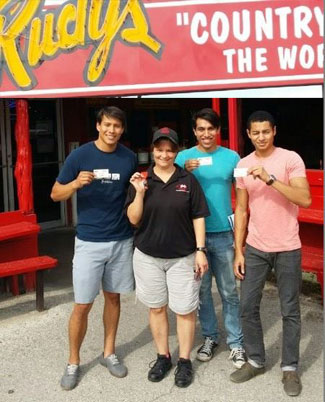Posted on October 7, 2014 by Lety Laurel

Paper Clip project participants
Negotiation theory is typically a subject covered in management classes, but McCarter took the lesson one step further when he challenged his students to put their newly learned negotiation skills to the test and create value with a paper clip. The twist is that everything acquired through these trades would be donated to the Family Violence Prevention Services Battered Women and Children’s Shelter.
“Experiential learning is the overall best method of learning,” said McCarter, assistant professor of management. “Most programs are good at teaching you how to plan things, but I wanted to design something where the students see what happens when the plan goes into effect.”
Negotiations happen every day. Whether it is something small like co-workers deciding where to eat lunch or something larger like negotiating a complex business merger. But, few people understand the science or theory behind negotiating.
McCarter’s negotiation module walked students through the theory of negotiating. From learning about the ABC’s of negotiation (acquire information, begin building reasons and claim value) to the art of strategic silence, the theoretical lessons were then applied as part of the paper clip project.
The project was modeled after the one red paper clip exercise conducted by a Canadian blogger who bartered his way from a single red paper clip to a house in a series of fourteen online trades over the course of a year.
The exercise had just four ground rules: teams must complete a minimum of six trades; no trades with family members; one trade must be at a pawn shop or flea market; and most importantly, the students could not say the trades were being made for charity. Instead, they had to rely on the negotiation skills they learned in class.
One team’s trade began with help from San Antonio Spur Danny Green. Contacted through Instagram, Green agreed to meet the students at a local store and accepted their paper clip for a signed eight ball.
“Our team thought about how we could obtain something of value, and our first reaction was to trade with someone famous,” said Claire DeRocher, a junior business major. “Once we made the trade, we could tell him the project benefited a local charity.”
Their final trade resulted in a microwave, futon and television being donated to the shelter.
Senior Emilio Cuellar’s experience with the paper clip project was more intense given that he had only five weeks to conduct the exercise during a summer session course. His team was charged with accumulating $500 worth of restaurant gift cards.
“We learned that when we started using the negotiation tactics, a lot of success happened,” said Cuellar, a senior majoring in engineering and minoring in business. Cuellar’s team created a Facebook page highlighting their trades, The Paper Clip Project: Trade of Thrones.
“We had to do one trade at a thrift store,” said Cuellar. “Our first tactic was to gather information on the store. We noticed that he sold a lot of furniture. Then, we started the negotiation. We wanted to trade a recliner that we had for a mountain bike. At first, he wanted to trade for money, but we couldn’t accept cash. We tried adding items to sweeten the deal. After 30 minutes, he got tired of our negotiations and just gave us the bike.”
Cuellar’s team made 18 trades that resulted in $775 in gift cards and vouchers, plus a few items that were donated to the shelter.
“To see these students be able to apply what they have learned in the classroom setting to real-life situations, and not only learn but also help give back to those in need is truly remarkable and very inspiring,” said Vanessa Rodriguez, director of volunteer services/community relations at the Family Violence Prevention Services, Inc.
“This has been my best class at UTSA,” said Justin Jolley, a junior majoring in accounting. “I learned so much during a short period of time. Pretty powerful what you can do if you plan it right.”
What was most rewarding for McCarter was watching the students utilize the principles during their everyday lives. “When you know why something happens, you’ll be able to make it happen in your career or personal life,” said McCarter, who revealed that one student used the tactics to negotiate a raise.
Cuellar learned firsthand the benefits of negotiation. When his laptop broke this summer, he put the principles into practice to negotiate a lower repair cost.
“They told me it would cost $70 for labor, but then another $70 for replacement parts,” said Cuellar. “We learned to ask why in class. So, I asked why I was being charged that amount. In the end, I got it repaired for less after I talked with them about the costs for the parts and the actual cost of labor.”
In the end, the students weren’t graded on the value of their trades, but their understanding of the theory behind the process. For their final exam, the students conducted professional presentations outlining their experience and their lessons learned.
“The lives of many women and children will be changed because of the generosity of the UTSA students that participated in the paper clip project,” said Marta Prada Pelaez, president and CEO of Family Violence Prevention Services, Inc.
Looking back on the project the students learned several valuable lessons that will last a lifetime. They learned how to negotiate; they learned to work as part of a team; and they learned that their skills could be used to assist others.
“A lot of people thought the paper clip project was impossible when we started,” said DeRocher. “Yet, we proved that we could learn to be successful in negotiations. It was also valuable to see that business skills can be applied to make a difference in people’s lives.”
Wendy Frost—
Please send your comments to: wendy.frost@utsa.edu


